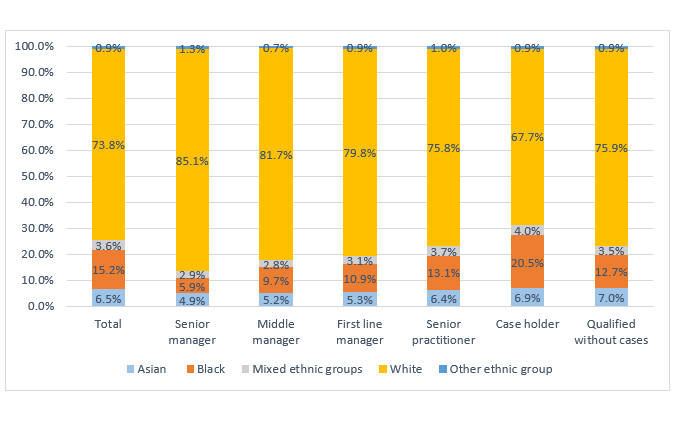ENGLAND
The figures presented below are taken from statistical reports gathered and published by government departments and bodies. Details of sources are provided at the foot of this page.
On this page:
Looked After Children
Ethnicity
Placements
Foster Placements
Legal Status
Adoption
Adoptions from Care
Awaiting Adoption
Waiting Times
Ethnicity
Adopter Characteristics
Special Guardianship
Ethnicity
Children's Social Workers
Ethnicity
Organisation Role by Ethnicity
Sources
LOOKED AFTER CHILDREN
On 31 March 2024:
- 83,630 children were in the care of local authorities, down 5% on 31 March 2023.
- the rate of looked after children per 10,000 children under 18 years was 70.
Ethnicity
During the year ending 31 March 2024:
- 71% (59,340) of looked after children were White
- 11% (8,920) of looked after children had a Mixed ethnic background
- 5% (4,420) of looked after children were Asian
- 7% (6,230) of looked after children were Black
- 5% (3,910) of looked after children were from any other ethnic group
- 1% (800) of looked after children were not known or not yet recorded.
Placements
On 31 March 2024:
- 67% (56,390) of children looked after were living with foster carers (11% in a foster placement with a relative or a friend, 51% with a foster carer who is not a relative or a friend)
- 10% (8,640) were living in secure homes and children's homes
- 6% (5,300) were placed with their parents
- 2% (1,910) were placed for adoption
- 7% (6,250) were independent and semi-independent living arrangements/ supported accommodation
- 69% (57,450) of looked after children had one placement in the year, 21% (17,490) had two placements, and 10% (8,700) had three or more placements.
Foster Placements
On 31 March 2024, of the 56,390 children in foster placements:
- 32,480 (39%) were placed inside the council boundary
- 13,670 (16%) were being fostered by a relative or friend
- 460 (0.8%) were in placements where the carer is also an approved adopter (fostering for adoption) or where they were subject to concurrent planning
Legal Status
On 31 March 2024:
- 62,723 (75%) children looked after under care orders
- 15,889 (19%) children looked after under voluntary agreements under Section 20 of Children's Act 1989
- 4,690 (5%) children looked after had a placement order granted
ADOPTION
Adoptions from Care
2,980 looked after children were adopted during the year ending 31 March 2024
Ethnicity
During the year ending 31 March 2024:
- 84% (2,490) of adopted children were White
- 11% (330) of adopted children had a Mixed ethnic background
- 1% (40) of adopted children were Black, African, Caribbean or Black British
- 1% (40) of adopted children were Asian or Asian British
- 1% (30) of adopted children were from any other ethnic group
Awaiting Adoption
3,690 children had an adoption best interest decision but were not yet placed at 31 March 2024.
2,190 children had a placement order but were not yet placed at 31 March 2024.
Waiting Times
883 - the average number of days between a child entering care and moving in with its adoptive family during the year 2023-24 (Adoption scorecard indicator A1)
304 - the average number of days between an LA receiving court authority to place a child and the LA deciding on a match to an adoptive family during the year 2023-24 (Adoption scorecard indicator A2)
Adopter Characteristics
During the year ending 31 March 2024:
- 87% (2,600) of children were adopted by couples and 13% (390) by single adopters.
- 20% (580) of children were adopted by same sex couples (either in a civil partnership, married or neither).
SPECIAL GUARDIANSHIP
During the year ending 31 March 2024:
- 3,860 children left care through a Special Guardianship Order
- 73% (2,810) Special Guardianship Orders were made to former foster carers, with 63% (2,450) made to former foster carers who were/are a relative or friend.
Ethnicity
During the year ending 31 March 2024:
- 82% (3,170) of children subject to a Special Guardianship Order were White
- 11% (420) of children subject to a Special Guardianship Order had a Mixed ethnic background
- 4% (150) of children subject to a Special Guardianship Order were Black, African, Caribbean or Black British
- 1% (60) of children subject to a Special Guardianship Order were Asian or Asian British
- 1% (20) of children subject to a Special Guardianship Order were from any other ethnic group
CHILDREN'S SOCIAL WORKERS
On 30 September 2024:
- 13% of children and family social workers were men.
- 88% of children and family social workers were women.
Ethnicity

*percentage is of the total of social workers whose ethnic background was known.
SOURCES
Department for Education: Children looked after in England including adoption: 2023 to 2024
The Department for Education Children looked after in England statistics include tables providing a breakdown of children in care by age, gender, ethnicity, legal status, reason for being in care, reasons for placement changes for children who moved placement in the year, fostering for adoption and concurrent planning, special guardianship, duration of latest period of care, adoption placements and care leavers activities, accommodation, children looked after who were missing, offending and substance misuse by looked after children, development, health, emotional health
Department for Education: Children's social work workforce 2024
The Department for Education Children's social work workforce statistics include tables providing information on children’s social workers including vacancy rate, turnover rate, sickness absence, caseload, age, gender, ethnic background, role, and time in service.
ASG: Adoption and Special Guardianship quarterly data reports: 2023 to 2024
The Adoption and Special Guardianship data reports on how local authority adoption agencies and voluntary adoption agencies are performing. Data covers children waiting for adoption, progress through the adoption process, characteristics of children waiting, characteristics of children adopted, child timeliness, adoptive families progress through the adoption process, prospective adopters waiting and adopter timeliness.
